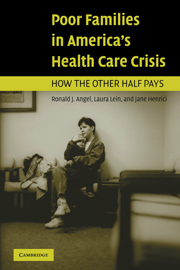Book contents
- Frontmatter
- Contents
- Preface
- Poor Families in America's Health Care Crisis
- 1 The Unrealized Hope of Welfare Reform: Implications for Health Care
- 2 The Health Care Welfare State in America
- 3 The Tattered Health Care Safety Net for Poor Americans
- 4 State Differences in Health Care Policies and Coverage
- 5 Work and Health Insurance: A Tenuous Tie for the Working Poor
- 6 Confronting the System: Minority Group Identity and Powerlessness
- 7 The Nonexistent Safety Net for Parents
- 8 Health Care for All Americans
- References
- Index
6 - Confronting the System: Minority Group Identity and Powerlessness
Published online by Cambridge University Press: 25 July 2009
- Frontmatter
- Contents
- Preface
- Poor Families in America's Health Care Crisis
- 1 The Unrealized Hope of Welfare Reform: Implications for Health Care
- 2 The Health Care Welfare State in America
- 3 The Tattered Health Care Safety Net for Poor Americans
- 4 State Differences in Health Care Policies and Coverage
- 5 Work and Health Insurance: A Tenuous Tie for the Working Poor
- 6 Confronting the System: Minority Group Identity and Powerlessness
- 7 The Nonexistent Safety Net for Parents
- 8 Health Care for All Americans
- References
- Index
Summary
The plight of low-income families like those in our study remains invisible and often incomprehensible to most middle-class white Americans. The poor, and particularly the minority poor, live in their own sections of town that most outsiders neither visit nor understand particularly well. What the average citizen knows about the poor is what he or she sees and hears on the evening news, gathers from the Internet, or reads in newspapers and magazines. Much of that information is negative and focuses on crime, family disruption, welfare dependence, and any number of other social pathologies. The fact that the waitresses, the busboys, the nurse's assistants, and the other service personnel that one encounters on a daily basis are so often black or speak Spanish among themselves only hints at the complex world that exists apart from America's richer neighborhoods and shopping areas. Although these low-wage workers are crucial to maintaining the high quality of life Americans enjoy, at the end of the day they return to their own neighborhoods and have little to do with the people they serve. They receive little thanks or appreciation for their efforts, and they receive even less money. They remain apart and outside the mainstream of middle-class American life.
- Type
- Chapter
- Information
- Poor Families in America's Health Care Crisis , pp. 129 - 157Publisher: Cambridge University PressPrint publication year: 2006



